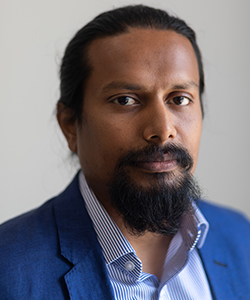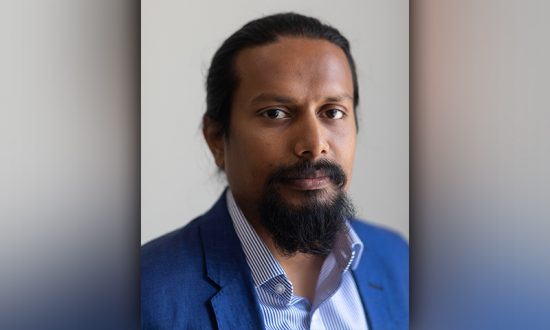Vishnu has over 15 years of experience in leadership development, school leadership and school administration. An alumnus of Harvard University, he is responsible for new school initiatives and strategic projects for the group, including curriculum development, instructional leadership, continuous school improvement, technology integration and leadership development. In his prior roles, he has been the head of the Senior School, grade IX economics teacher and a trekking instructor.
“COVID19 has ushered in a time of change and forced paradigm shifts in many areas. It has forced us to rethink the traditional school model and question the way we teach.”
If several reports and warnings from the World Health Organization are to be believed, the coronavirus might be here to stay. It is said that the virus, without a vaccine, could take years for the global population to build up sufficient levels of immunity. While there might be a significant difference in the number of COVID-19 cases across the globe, there are currently more than 1.2 billion children in 186 countries affected by school closures due to the pandemic.
In response to the current situation, educators have been instrumental in finding new ways to ensure learning continues for children by developing online and offline learning materials; learning about the working of video conferencing tools to be able to meet students regularly and conducting mental & social well-being sessions during the start of the school day and at closure.
Virtual school might be relatively a new concept in India, but we are experiencing a new trend of the blended learning model gaining popularity. We have to acknowledge that virtual school is not just about taking a lesson through a video conferencing tool; it involves more than that. It involves a paradigm shift in pedagogy through an understanding of the blended learning model by teachers, parents and students. The balance of online and offline tasks is a critical aspect to consider while designing the timetable and lesson plan. This model helps learning to continue beyond the four walls of the classroom, allows students’ choice and flexibility to learn at their pace, creates more opportunities for collaborative tasks along with providing opportunities to rethink the mode of assessments & feedback. Virtual education has opened up possibilities of rethinking the way we are doing teaching & learning. The use of educational technology tools can begin to transform the classroom, and most of it depends on the creative agency of the teacher.
We also need to acknowledge that the transition to virtual learning can be challenging for all stakeholders. Parents will have to think differently about how to equip their children in the virtual learning space; how to create structures and routines that allow their children to be successful; and how to support their learning journey while considering the emotional well-being as well. Schools like hospitals are caregivers and we, as a school will fall back on the school framework of Relevance, Relationship and Rigour to support parents in this process of creating meaningful engagement with their children.
To get a fair understanding of online education, let’s have a look at some of its advantages:
- As students’ progress through classes, they seek more autonomy and intellectual freedom. Online learning can help them pursue highly personalised learning programs, possibly even college-level courses. These combined with hands-on exercises, real-world exploration, and thorough assessments can be highly beneficial to their learning progress.
- By trying out introductory topics from different fields, it allows the students to explore their options before committing to any specialisation. Online learning techniques make these students become more independent learners.
- Since online learning provides greater control to users through the use of minimal infrastructure, the students can personalise their learning. This enables students to take up new courses and learn almost from anywhere and anytime.
- Everyone has a different and unique learning pace matched by delivery of online learning. Online learners benefit from flexible learning schedules.
- Online learning offers an enhanced discussion element, often in a forum for discussion board.
- With an estimated 93% of communication being non-verbal, online learners do not have to worry about body language interfering with their message. Online education eliminates physical judgments that can cloud rational discussion.
- At traditional schools, talking to a teacher after class can be challenging. This is not the case in an online learning environment.
- Online learning makes parent-teacher collaboration positive and transparent.
- Online systems permit deep analytical summaries of a students’ progress. This helps in creating a personalised learning journey for each student.
Furthermore, with this sudden shift away from the classroom in many parts of the globe, the adoption of online learning will continue to persist post-pandemic, and such a shift would impact the worldwide education market. By following an interactive, collaborative approach, the students and instructors will co-create the learning process and for the better!
More About Vishnu Karthik
 A proponent of experiential learning, he has visited over 50 experiential and deeper learning schools worldwide. Among his other administrative responsibilities, he is keenly interested in building instructional leadership capabilities, cognitive neuroscience, education technology, college readiness and placements, student leadership development, adolescent coaching, authentic assessments and deeper learning curriculum. He has also been a management consultant and worked with organisations like Accenture and Right Management in the areas of leadership development, organisation change management and learning design. He has delivered projects in India, USA, South East Asia and Europe. In 2009, he co-authored (along with Swami Mitrananda) Se(a)king – a travelogue on a 14-day sojourn across the Arabian sea on a cargo ship. He is a practitioner of Yoga and Vedanta and believes that his work is a medium to reach his deeper self. He is also a proud father of a daughter who has Down syndrome.
A proponent of experiential learning, he has visited over 50 experiential and deeper learning schools worldwide. Among his other administrative responsibilities, he is keenly interested in building instructional leadership capabilities, cognitive neuroscience, education technology, college readiness and placements, student leadership development, adolescent coaching, authentic assessments and deeper learning curriculum. He has also been a management consultant and worked with organisations like Accenture and Right Management in the areas of leadership development, organisation change management and learning design. He has delivered projects in India, USA, South East Asia and Europe. In 2009, he co-authored (along with Swami Mitrananda) Se(a)king – a travelogue on a 14-day sojourn across the Arabian sea on a cargo ship. He is a practitioner of Yoga and Vedanta and believes that his work is a medium to reach his deeper self. He is also a proud father of a daughter who has Down syndrome.




